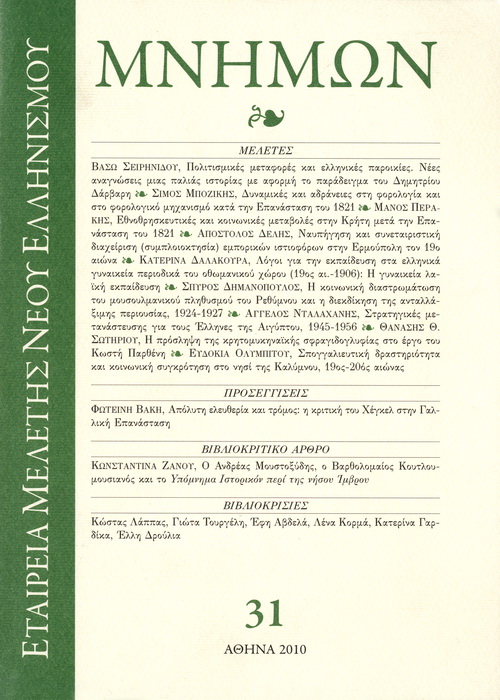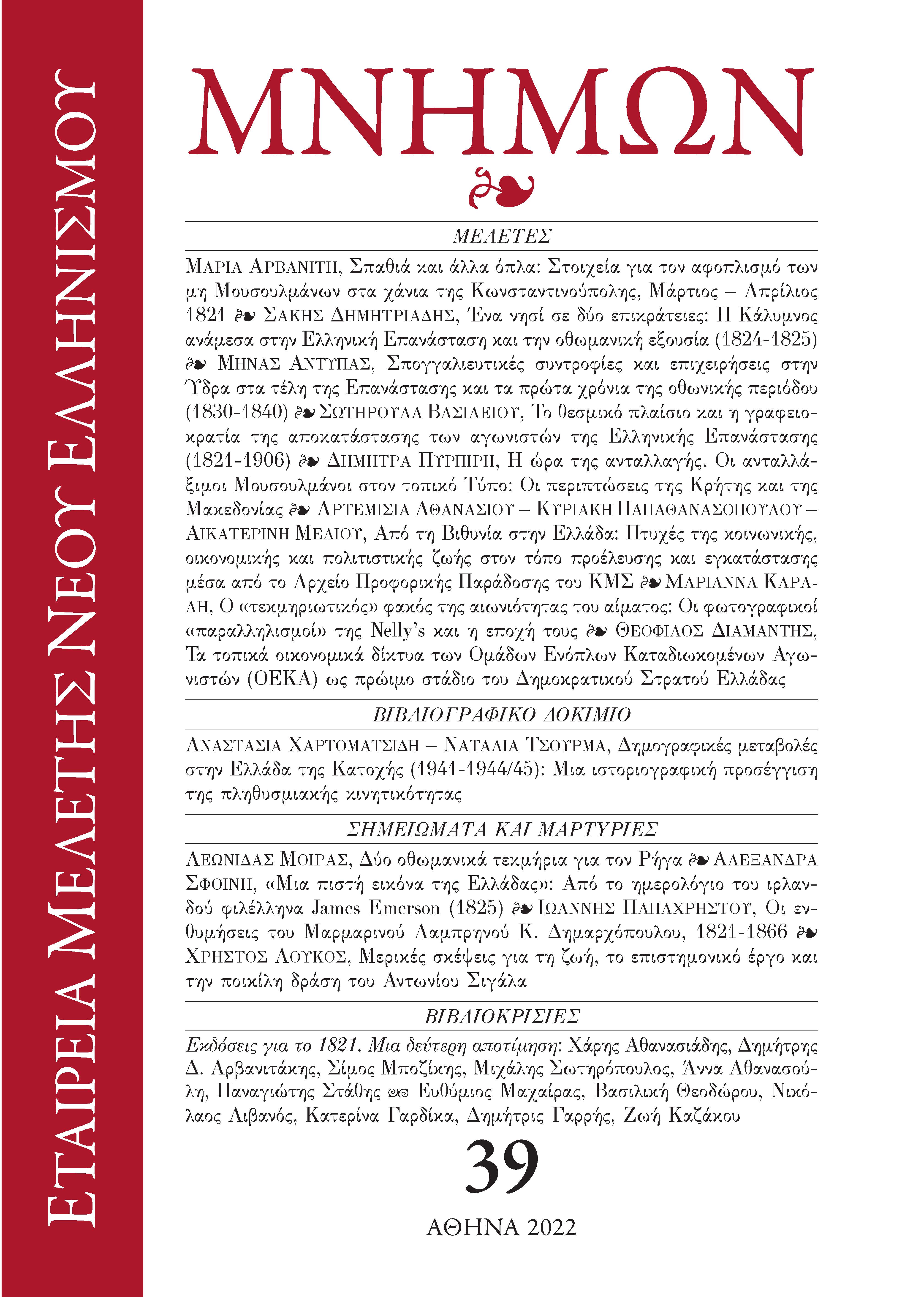Δυναμικές και αδράνειες στη φορολογία και στο φορολογικό μηχανισμό κατά την Επανάσταση του 1821 <html />
Περίληψη
Simeon Bozikis, Dynamics and stagnation of the taxation and the tax mechanism during the Greek Revolution of 1821
The main objective of the Greek revolutionaries in 1821, namely the achievement of political existence and independence, depended also on ensuring the necessary financial resources required for the war. A part of these resources was gathered through the taxation mechanism. The aim of this article is to provide new evidence in order to elucidate certain aspects of taxation and the taxation mechanism. At first, the article focuses on the implications of the Temporary Administration’s political decisions on taxation and its mechanism, proceeding with the investigation of the tax farmers’ features, practices and relations with the State. During the Revolution, the tax payers experienced a significant mitigation of the tax burden. Specifically, the lower tax burden, which was observed after 1821, means that the tax mechanism provided a lower return compared to the other sources of income of the Temporary Administration. Indeed, the allocation of tax revenues (in order to meet the districts’ and the army’s needs regarding wages and supplies) attached an essential role to their mechanism in fulfilling the Administration’s responsibilities. The tax farmers played a crucial role in ascertaining and collecting taxes. The latter usually acted individually and the geographical scope of their action was rather restricted. However, the collection of taxes by a group of individuals (cooperative, community) was a common phenomenon. At the beginning of the Revolution, there was a large number of tax farmers per district, but during the Revolution their number fell dramatically. As the study of the tax farmers’ social geography demonstrates, the taxation mechanism was not a field of privileged, stable and constant predominance of a leading powerful group. Of course, those leading groups, whose features matched an area’s local social, historical and demographic characteristics had a more distinct presence in that place. The Greek revolutionaries, through the establishment of institutions of political administration, ratified by the people, created a new kind of links between the citizens and the institutions that were being established, accelerated the historical processes and revealed dynamics with multiplying effects. The consolidation, ultimately, of state power and its special forms – such as taxation – were marked by radical and neoteric political principles. However, the expression of the latter at the local society level intersected with the traditional forms of social domination.
Λεπτομέρειες άρθρου
- Πώς να δημιουργήσετε Αναφορές
-
ΜΠΟΖΙΚΗΣ Σ. (2012). Δυναμικές και αδράνειες στη φορολογία και στο φορολογικό μηχανισμό κατά την Επανάσταση του 1821: <html />. Μνήμων, 31, 31–70. https://doi.org/10.12681/mnimon.23
- Τεύχος
- Τόμ. 31 (2010)
- Ενότητα
- ΜΕΛΕΤΕΣ
Οι συγγραφείς των άρθρων που δημοσιεύονται στο Μνήμονα διατηρούν τα δικαιώματα πνευματικής ιδιοκτησίας επί των άρθρων τους, δίνοντας στο περιοδικό το δικαίωμα της πρώτης δημοσίευσης. Άρθρα που δημοσιεύονται στο Μνήμονα μπορούν να χρησιμοποιούνται ελεύθερα, χωρίς δικαίωμα τροποποίησης (δημιουργία παράγωγου έργου) με αναφορά στο συγγραφέα και στην πρώτη δημοσίευση για μη κερδοσκοπικούς σκοπούς(άδεια Creative Commons 4.0). To Εθνικό Ίδρυμα Ερευνών διατηρεί το δικαίωμα να δημοσιεύει, να αναπαραγάγει, να παρουσιάζει στο κοινό, να διανέμει και χρησιμοποιεί άρθρα που δημοσιεύονται στο Μνήμονα σε οποιοδήποτε μέσο και μορφή είτε μεμονωμένα είτε ως μέρη συλλογικών έργων, για όλο το χρόνο διάρκειας προστασίας της πνευματικής ιδιοκτησίας και για όλες τις χώρες του κόσμου. Αυτό περιλαμβάνει ενδεικτικά και όχι αποκλειστικά, το δικαίωμα δημοσίευσης των άρθρων σε τεύχη του περιοδικού Μνήμων, αναπαραγωγής και διανομής μεμονωμένων αντιγράφων των άρθρων, αναπαραγωγής ολόκληρων των άρθρων σε άλλη έκδοση του ΕΙΕ, και αναπαραγωγής και διανομής των άρθρων ή περίληψης αυτών με χρήση πληροφορικού συστήματος αποθετηρίου.




